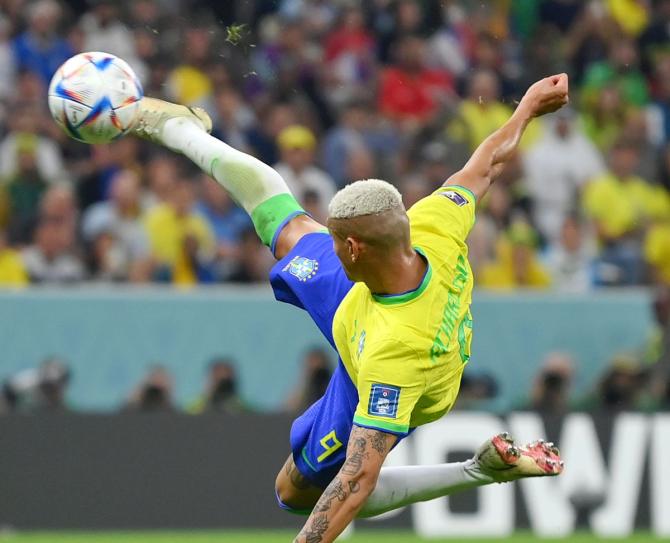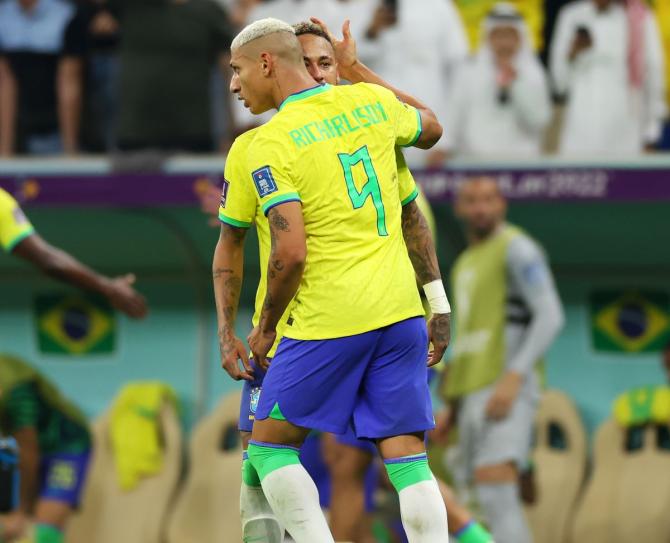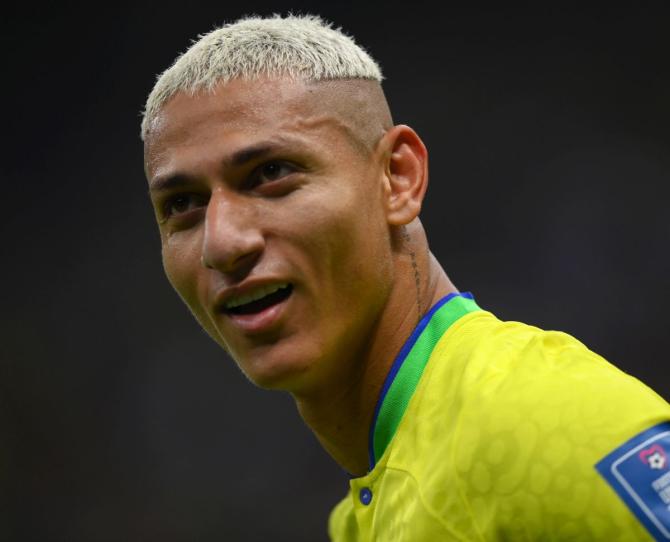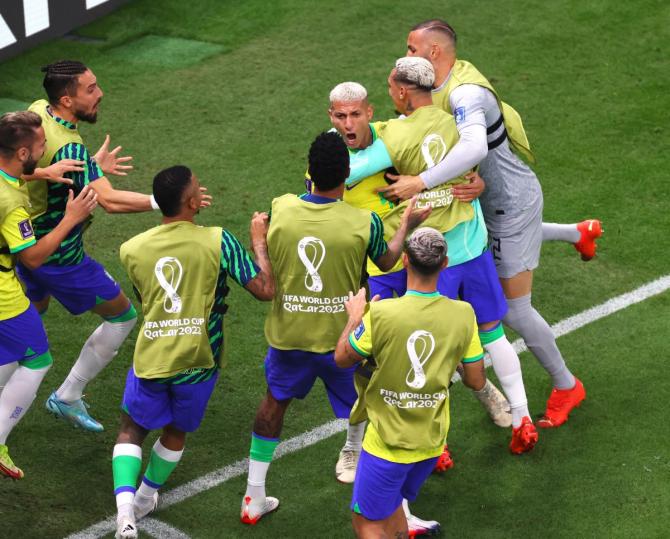 | « Back to article | Print this article |
Richarlison is a rarity among the overindulged footballing elite.
In a World Cup which has been overshadowed by social issues, Brazil's latest football sensation is championing more than just one cause, observes Deepti Patwardhan.

It hasn't been easy to navigate through the 2022 FIFA World Cup.
For starters, it is being played in the winter in Qatar, a country with little football pedigree but flush with petrodollars.
There is air-conditioning in the eight spanking new stadiums, but much to the travelling football fan's disappointment, no promised beer.
In the first week itself, two of the pre-tournament favourites suffered shock defeats.
Lionel Messi and his band of Argentines were trumped 2-1 by Saudi Arabia while Japan defeated Germany by the same scoreline.
Due to a new methodology of counting minutes wasted when the ball is not in play, the added-on time now resembles half of extra time.
Though the tournament has started, and the football has been sporadically brilliant, it remains morally conflicting.
Not just because it laid bare FIFA's greed and corruption, but the utter disregard of human rights issues in Qatar, which has dominated the narrative since the West Asian country was granted hosting rights in 2010.

Qatar reportedly spent $200 billion in putting the World Cup together, a majority of which was spent on building the eight stadiums from scratch.
Though the country officially said three migrant workers had died during the construction from work-related accidents, The Guardian reported the figure is more likely to be over 6,500 -- of which 2,711 were from India.
The country has a terrible human rights record and forbids homosexuality.
The captains of seven European teams had planned to wear 'One Love' rainbow armbands to show their solidarity with the LGBTQ+ community. But the threat of a yellow card sent them into a hasty retreat.
This is not the first time that an oppressive regime has used football's global appeal to serve an end.
In 1978, the World Cup took place in Argentina under a dictatorship, where political prisoners were held a mile away from River Plate's Monumental stadium.
The last edition of the tournament was held in Vladimir Putin's Russia. But the lack of football culture in Qatar and the obvious social transgressions have painted this World Cup in a deeper shade of sinister.
Caught during so many real-world problems, football seemed insignificant, irrelevant even.

Then came Richarlison. The blond-haired Brazilian chased some of the gloom away and showed why, in its own way, sport still matters.
He is everything we know and love about Brazilian football.
Talented, flamboyant and goes by a single name.
Brazil's latest No 9 announced himself on the biggest stage as he scored both goals in the team's 2-0 win over Serbia.
It was the second goal that left the football world awestruck.
Richarlison picked up a smart cross from Vinicius Jr, chipped it on the first touch before he scissor-kicked the ball into goal.
But his rare genius is not the only thing that sets him apart.
Richarlison's is the story of empowerment that sport prides itself on.
Born in a poor family in Nova Venecia, Richarlison had a tough childhood on streets ruled by drugs and violence.
while a lot of his friends became cogs in the drug trade, he earned his money by selling ice cream or chocolates, working in a cafe and as a bricklayer's assistant.
'When I was seven my dad bought ten balls for me, not because he could afford to do it but because he wanted me to be a good footballer,' the Brazilian was quoted as saying in the British media.
After a series of rejections by clubs, he got his first big break with America Mineiro's youth team.
From there he moved to Brazilian top-tier club Fluminense, then Watford and was signed by Tottenham Hotspur, from Everton, for a fee of 60 million pounds.

A self-made man, Richarlison is also a rarity among the overindulged footballing elite.
In recent years, the Brazilian has emerged as a voice for the marginalised.
He has spoken out against racism and police violence and for rape victims, he adopted a jaguar to raise environmental awareness and paid for a group of Brazilian students to compete in a maths quiz in Taiwan.
During the pandemic, when then Brazilian president Jair Bolsonaro, dismissed coronavirus as a 'little flu', Richarlison funded vaccine research in the country and donated oxygen cylinders to the Amazon city of Manaus.
'All of us who play in big leagues and have space in the media, we have a great social responsibility,' he said after being named the PFA Community Champion by Everton after Richarlison organised a charity match in Nova Venecia that generated 6.4 tonnes of food.
'At first, I just wanted to buy a house for my parents, but then I saw that I could do bigger things.'
Richarlison scored his World Cup goals against Serbia in the Selecao 's iconic yellow-and-blue kit. But it was almost not to be.
Brazil was contemplating not wearing the famous colours because of their recent social connotations.
Since 2018, Bolsonaro has used football and the talismanic canary yellow jersey as a political symbol. His supporters are known to wear it at his rallies and campaigns.
Brazilian footballers, a lot more famous than Richarlison, from Pele to Neymar, have tried to whitewash Bolsonaro's controversial reign.
Neymar and Dani Alves also supported his recent re-election bid, which he lost.
Again, Richarlison was one of the few in the Brazilian football circles who publicly criticised Bolsonaro and his politicising of the football jersey.
In a World Cup which has been overshadowed by social issues, Brazil's latest football sensation is championing more than just one cause.
Deepti Patwardhan is a freelance sports writer based in Mumbai.
Feature Presentation: Rajesh Alva/Rediff.com